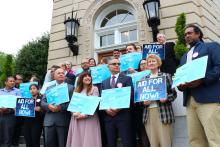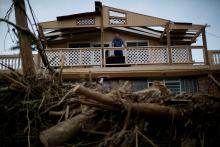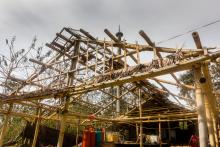Aid

“It was chaos,” sighed Stacey Hall Burge, CEO of Found House Interfaith Housing Network, which provides emergency shelter and programs for families dealing with housing loss and insecurity in the Cincinnati area.
“From Monday to Friday, we had no specifics, no clarity,” said Burge, recounting the past week at her organization. “There are rents and supports for hundreds of families I am not sure how to pay right now. Families that worked hard to get off the streets, who may go right back. Many of them working, but unable to fully afford rent in the current housing crisis,” she told Sojourners in an interview over Zoom.

In the meantime, Caño Martín Peña remains severely clogged and needs to be dredged to prevent continued flooding. Corporación ENLACE, an organization led by residents of Caño Martín Peña, has called on Congress to add a supplemental fund of $100 million to the disaster relief bill to dredge the channel.

In Washington, many lawmakers have criticized FEMA as having too lenient standards for determining whether Puerto Ricans’ homes damaged by the hurricane are livable. Sen. Elizabeth Warren (D-Mass.) said one home FEMA defined as “hospitable” doesn’t have a secure roof, doors, or windows, and may not have access to power or clean water.

One could say dignity has three elements: Agency, that entails people being able to act autonomously and use their gifts and thrive; recognition, that provides a sense of value in the social communities that all people find themselves in; and implementation and institutionalization of that agency and recognition, to ensure dignity’s presence over time.

Meanwhile, Puerto Rico remains flooded and without power. The aftermath of the storm continues to unfold as the damage builds upon itself, forcing hundreds from their homes. Without electricity, cell service, or reliable communications, the situation on the ground is difficult to imagine for Americans living on the mainland.

HILDA DE BOJORQUEZ holds a set of blueprints in one hand. Her other hand is pointing. At a better future, perhaps, if things go well.
De Bojorquez is the chief engineer at this construction site in a neighborhood just outside Port-au-Prince still blemished with rubble from Haiti’s 2010 earthquake. She commands respect from the all-male crew of Haitians working at the site—she tells a group of visiting U.S. reporters that her gender has never been an issue in the male-dominated world of construction, here or in her native El Salvador.
When asked about obstacles on the project, De Bojorquez goes on for 15 minutes—she’s an engineer, after all—but the point is that they’ve tackled them, one by one, and done so the right way. She extols the importance of a solid foundation and robust retaining walls. She points to the cinder blocks and the rebar, and explains how her group had to teach a company how to provide high-quality materials, with the promise that they’d buy everything the company made. And she emphasizes that she’s there not just to oversee a number of construction projects, but to train Haitians to do it themselves the next time—and to do it right.
The steel-reinforced blocks are rising into walls that will surround a new six-room school for perhaps 200 children in this neighborhood four miles east of Port-au-Prince. The narrow site is wedged between two crumbling buildings, both showing earthquake damage. Even to an untrained eye, the differences are obvious between the fragile, deteriorating blocks next door and the solid retaining walls rising at our feet.

IN THE EARLY evening of Nov. 8, 2013, Arnel Montero convinced his mother, wife, and three children to evacuate to a two-story concrete house above the coastal area of Barangay 70, a fishing village in Tacloban City, on the island of Leyte in Central Philippines. He expected the worst, with the news reporting the arrival of super-typhoon Haiyan the following morning, and thought the house would be a safe place where his family could take shelter while he remained in their shanty by the coast.
Even though Haiyan’s fury hit the islands at speeds surpassing 200 miles per hour, the strong winds alone would not have created such a major tragedy. But Haiyan precipitated a storm surge that led to grave loss of life and massive devastation. Barangay 70 is located near the city’s main pier, and the tidal waters pushed cargo boats toward the coast, smashing shanties and buildings, including the concrete house where Arnel’s family sought shelter. Arnel managed to save himself, but the rest of his family perished.
The National Disaster Risk Reduction and Management Council, as of mid-March 2014, reported 6,268 deaths, although the actual number could be double that. In Barangay 70 alone, there were close to 300 people who died. An estimated 12.2 million Filipinos were affected by the disaster that hit eight provinces in the Visayas islands region; close to 2 million houses were either washed out or partially destroyed.
The national and local government’s response to the massive need for relief operations was slow. Political bickering, incompetent local governments, and the sheer inefficiency of the administration of President Benigno Aquino all contributed to major delays in bringing food, potable water, clothing, medicine, and temporary shelter to the survivors. Weeks after Haiyan struck, interior villages still had not received aid. It was not until early January 2014 that government relief agencies managed to set up the systematic distribution of relief goods.

On my way home one day this past winter, I saw a woman standing at an intersection, holding a cardboard sign saying she had nothing to eat. Her face was red from the chilling wind. She looked forlorn.
I stopped for the red light and grabbed my wallet to get a few dollars for her. Oops, all I had was a $20 bill. That’s more than I’d intended to give her.
She looked forlorn. I couldn’t just drive past.
I lowered my window and handed her the bill. Her eyes brightened. She grabbed my hand tightly with both of hers — she wore knit gloves that left her cold fingers unprotected. She squeezed hard.
“Thank you,” she said, pumping my hand. “God bless you! Thank you! Thank you!”
As I raised the window, I watched her step back, go to one knee, clasp her hands, look up to the sky and mouth the words, “Thank you! Thank you! Thank you!” Then she made the sign of the cross.
At that moment, it struck me: I’d become the answer to her prayer.

As has happened many times after I have given a talk about the Body of Christ’s responsibility to care for their brothers and sisters experiencing impoverished and dehumanizing conditions, I was asked to answerthose questions — the ones in my experience that are always the first to be asked the moment I stop speaking.
“How will I know I have given enough? How does the church balance financial responsibility with service to the poor? Where do we draw the line?”
These questions always come, sometimes spoken in a curious tone by a person whose heart is being convicted, sometimes in an angry accusing tone insinuating I must hate prosperity, sometimes privately as a whisper in my ear or in a personal email filled with insinuations about my sanity. What a preposterous proposal, that the Body of Christ in any particular location should be the first resource to its own community for spiritual, physical, and emotional well being! Don’t I know that such a mission is naïve and impossible to achieve? Most recently it was phrased like this: “I love this idea, but it is difficult to see benevolence funds go towards someone's electric bill when they smell like they smoked five packs of cigs before meeting with us; what do we do?”
WASHINGTON — As a coalition of mostly Christian groups gathered here Thursday to support church leaders who have publicly questioned U.S. aid to Israel, those same church leaders signaled that they want to reconcile with the Jewish groups who were upset by their action.
An Oct. 5 letter asking Congress to investigate U.S. aid to Israel led Jewish groups to cancel a long-planned meeting later that month of the Christian-Jewish Roundtable, a eight-year-old group dedicated to improving relations between the two faiths.
The Rev. Gradye Parsons, the top official of the Presbyterian Church (USA) and the first signatory on the letter, did not attend Thursday's Washington press conference that was convened to support its message. But Parsons said he stands by the letter, and acknowledged that it heightened tensions between Jews and Christians on the roundtable.
“We regret any distancing it put between us and our Jewish partners," he said, "and we hope we can close that gap."
Wall Street has been devastating Main Street for some time. And when the politicians -- most of them bought by Wall Street -- say nothing, it's called "responsible economics." But when somebody, anybody, complains about people suffering and that the political deck in official Washington has been stacked in favor of Wall Street, the accusation of class warfare quickly emerges. "Just who do these people think they are," they ask. The truth is that the people screaming about class warfare this week aren't really concerned about the warfare. They're just concerned that their class -- or the class that has bought and paid for their political careers -- continues to win the war.
So where is God in all of this? Is God into class warfare? No, of course not. God really does love us all, sinners and saints alike, rich and poor, mansion dwellers and ghetto dwellers. But the God of the Bible has a special concern for the poor and is openly suspicious of the rich. And if that is not clear in the Bible nothing is.
We're sorely missing the servant leadership of America's CEOs on matters of corporate taxation.
As Congress contemplates trillions in budget cuts that will worsen poverty and undermine the quality of life in America, consider these findings from a new report that I co-authored, "Massive CEO Rewards for Tax Dodging," by the Institute for Policy Studies.
Last year, the compensation of 25 CEOs at major profitable U.S. companies was larger than the entire amount their company paid in U.S. corporate taxes.
These 25 include the CEOs of Verizon, Boeing, Honeywell, General Electric, International Paper, Prudential, eBay, Bank of New York Mellon, Ford, Motorola, Qwest Communications, Dow Chemical, and Stanley Black and Decker.
The recent British film In Our Name is a returning-soldier drama featuring a married woman, Suzy, who leaves her husband and little girl to fight in Iraq. Because she's involved in the killing of a little girl during her tour-this part is based on a true story, but it happened to a man -- she returns home only to steadily fall apart under the stress of soul-destroying anxieties.
Picture this: Hundreds of thousands of women, men, and children plod across barren cracked earth. Dead cows and human corpses litter the roads, revealing to us evidence of two things: 1) the hottest summer on record in Somalia, which caused the worst drought and famine in 60 years; and 2) twenty years of a truly failed Somali government swallowed up in cycles of violence.
Picture this: Posturing politicians claim to stand up for the rights of Americans, even as they hijack the proverbial steering wheel of America. They hold a proverbial gun to the heads of every American, and say outright that they'd have no problem driving us all off a proverbial cliff if millionaires and billionaires don't remain protected from raised taxes, and if we don't cut more programs that protect working and poor people.
What is wrong with the typical photo of world leaders making decisions for their countries? The general absence of women -- at the table, in the room, and, as a result, from the agenda.